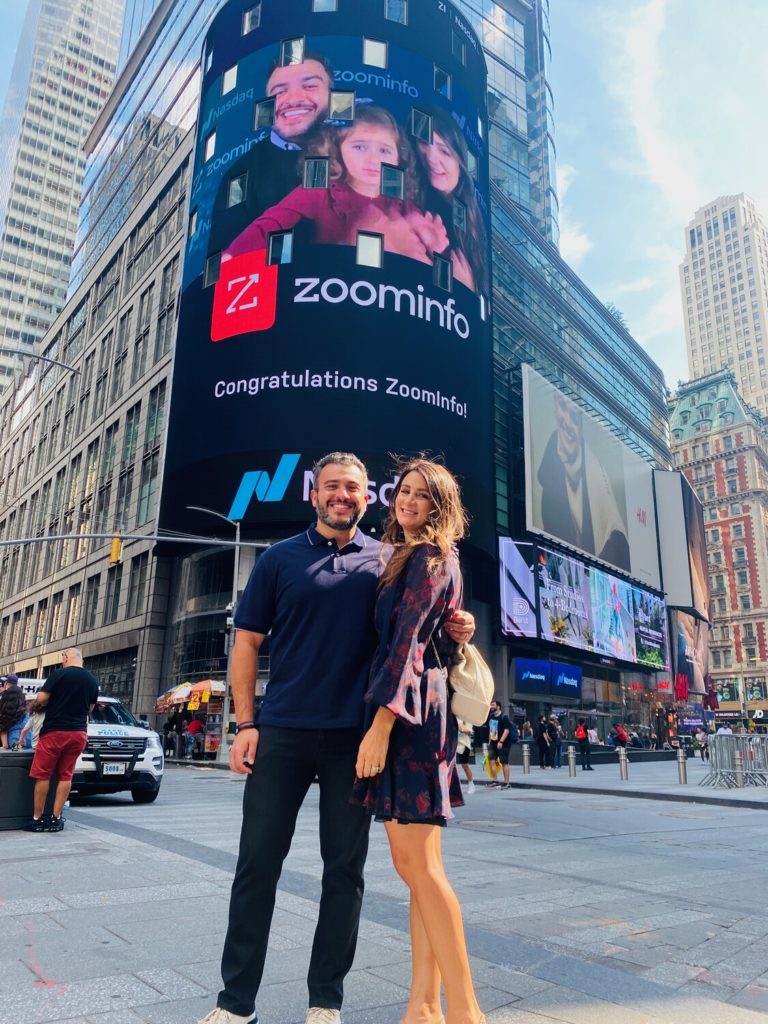It’s been two years since ZoomInfo went public.
Two years in a pandemic, and two years of chaos, excitement, learning, and adjusting. And two years of feeling really proud of the things my team continues to accomplish.
From the outside looking in, ZoomInfo’s success may seem like a cakewalk — we were at the right place at the right time and everything just came together. But that’s not exactly the case.
There have been plenty of hiccups, roadblocks, and even some massive mountains that we didn’t think we would overcome. From the early days when we were known as DiscoverOrg, to the recent months going through new acquisitions, the journey of ZoomInfo has been difficult at times — but nothing short of incredible.
I’d like to share 10 invaluable lessons that I’ve learned over the past two years in our transition from a private company to a public one.

1. Work is work. Find alignment.
There’s a saying that I’m sure we’ve all heard: “Find a job you enjoy doing, and you will never have to work a day in your life.”
I don’t think this is entirely true — work is work. It’s still hard at times, and it’s an easy second to spending time with my family or friends or going on vacation.
But I never feel like my job is a grind. I never feel like I can’t do my job or I’m not good at my job. It’s challenging and requires a lot of effort, but I love what I do and I’m happy to do it.
Find work alignment where the effort you’re putting in is commensurate with the impact you’re seeing.
2. Success comes from the inability to be content.
This is something I’ve said for years, but I want to expand on it.
Yes, don’t sit stagnant, always look for ways to improve. But make sure the people around you are OK with your constant need for progress, because it’s a tough characteristic to adapt to.
I’m always looking for areas in my business that aren’t operating as efficiently as they could be. This means that whether things are going really well or not in the business, my viewpoint is always, “where can we improve?”
As you can imagine, this mentality can be frustrating to my teammates. It took time for my employees to understand that my pushing for improvement happens because I believe so strongly in what we all can accomplish, individually and together. It’s important to always communicate your drive and belief in your team, so that they can fully grasp and join your incessant search to be 1 percent better every day.
3. Reflect often.
Twice a year, I write a memo to my executive team where I pretend to be a new CEO in the business and I’m 60 days into my job. I write down all of the mistakes that “old Henry” made and how “new Henry” will course-correct.
This is a helpful exercise for me to really think about how I’ve helped or hindered parts of the business. It humbles me and gives me a refreshed perspective so I can move forward with renewed energy.
4. Efficiency and frugality will pay off.
ZoomInfo came from humble bootstrapped beginnings. We’ve always operated efficiently, and for the first four years it was because we had to. My co-founder and I maxed out our credit cards to start this business in 2007, and we didn’t have the insulation to run the company without regard for every cent.
There was a time when it embarrassed me that we had to be so frugal, but that’s what allowed us to scale so effectively. We watched as other software companies that weren’t focused on operational efficiency received hundreds of millions of dollars from venture capitalists. We didn’t work that way and sometimes that got to me.
But it was because of our efficiency that we were able to acquire companies and excite investors. It was clear that we could run a cost-effective, successful organization without throwing money down the drain. We even ended up acquiring competitors who had received money from venture capitalists because we ultimately knew how to operate better.
So this thing that at one time embarrassed me became our market differentiator and a key to our successful strategy.
5. Get and keep people around you that believe in you.
Before going public, I had my fair share of folks tell me that what I was trying to accomplish wouldn’t happen. Now, as the CEO of a publicly traded company, there are more eyes on me than ever before — and unavoidably more critics.
But I know, and my team knows, that what we’re doing at ZoomInfo is great. If I had listened to those individuals who said I wasn’t going to get where I am, I would have been robbed of my potential. I’m grateful everyday for the team at ZoomInfo that stands by me, and I will always return the same support.
6. Trust your team.
You should trust those around you to do their jobs well. If you don’t, you need to take a step back and ask why. Where is your lack of trust stemming from? Did you hire the right people? Are you attempting to compensate for failures elsewhere?
Asking these questions will help you get to the root of the issue. Whether it’s a personnel problem — or a you problem — you’ve got to make changes immediately.
7. Be honest about talent.
Along those same lines, you have to be really honest about the strength of your talent. It’s easy to hire the wrong person — it happens all the time. It’s more difficult to acknowledge your mistakes. But it doesn’t benefit you, your employees, or the company to keep subgrade people around.
I was crazy vigilant about talent in sales. If a person wasn’t working out, I would make changes immediately. But in areas where I hadn’t learned the skills, like product development, engineering, or marketing, I let things linger too long. This was a bad decision and affected the business pretty broadly.
Go see what good talent looks like. Take informational interviews. Be honest about whether your own talent lines up. And be prepared to make the necessary adjustments.
8. Get your product and engineering teams on sales calls.
There’s so much that happens on a sales call. It’s magical. People are REAL. They get really honest really quickly when you’re asking them for their money. They will tell you exactly what they think of your product, features, and service.
If the teams that build your product don’t have opportunities to interact with the customer, you’ll never have a great product, because they’ll never get the direct customer feedback that inspires real improvement.
Your teams will complain. They’ll say it’s a waste of time, that they’re busy. They may even threaten your product roadmap if you make them do it.
Make them do it anyway.
9. Your voice is important.
You have a voice. Your board and investors want to hear that voice.
I built a board of the smartest, most talented people. They give me a lot of money to run the business. I would often end up deferring to them because it’s easy to fall into that role.
“Just tell me what I should do and I’ll go do it,” I’d say.
Thankfully, one of my board members, Randy Winn, straightened me out: “That’s not how this should work. We’re not involved in the day-to-day. We don’t know how your company operates. You do. We’re here to advise. It’s your job to listen to our advice, but you decide what you want to do.”
You have to speak up and say things like, “I hear you, but what you’re asking isn’t going to work.” Or “I hear you and I’ll get there, but not today. We’re not ready.”
That’s the importance and value of your voice.
10. Prioritize developing your people.
You have to be a great developer of people, especially when you’re just starting out. You have to be able to take raw talent and turn it into real value by building leaders at your company, because you can’t always go out and compete with big companies like Google for talent.
You’ll have to build your talent from the ground up. Embrace and invest in people development and be sure to build good career paths, because your people need to see a path for success — or they’ll eventually leave and take their developed talents with them.
It’s exhilarating to see how far ZoomInfo has come. I’m constantly astounded by our employees, by our success, and by our future. Here’s to many more years of chaos, excitement, learning, and adjusting.

